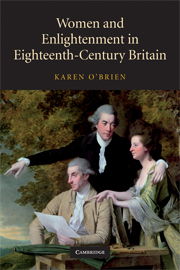Book contents
- Frontmatter
- Contents
- Acknowledgements
- Introduction: the progress of society
- 1 Anglican Whig feminism in England, 1690–1760: self-love, reason and social benevolence
- 2 From savage to Scotswoman: the history of femininity
- 3 Roman, Gothic and medieval women: the historicisation of womanhood, 1750–c.1804
- 4 Catharine Macaulay's histories of England: liberty, civilisation and the female historian
- 5 Good manners and partial civilisation in the writings of Mary Wollstonecraft
- 6 The history women and the population men, 1760–1830
- Notes
- Bibliography
- Index
2 - From savage to Scotswoman: the history of femininity
Published online by Cambridge University Press: 04 September 2009
- Frontmatter
- Contents
- Acknowledgements
- Introduction: the progress of society
- 1 Anglican Whig feminism in England, 1690–1760: self-love, reason and social benevolence
- 2 From savage to Scotswoman: the history of femininity
- 3 Roman, Gothic and medieval women: the historicisation of womanhood, 1750–c.1804
- 4 Catharine Macaulay's histories of England: liberty, civilisation and the female historian
- 5 Good manners and partial civilisation in the writings of Mary Wollstonecraft
- 6 The history women and the population men, 1760–1830
- Notes
- Bibliography
- Index
Summary
We have seen how women writers participated in English philosophical debate about the implications of Locke's empirical epistemology for the derivation of religious beliefs, and also for the source of the obligation to be virtuous. In the wake of the work of Shaftesbury and Butler, women writers of an emerging, Bluestocking tradition elaborated and defended a view of men and women as fundamentally benevolent (in a self-cultivated and rational, rather than irrational, spontaneous way), and as realising their nature in the voluntary exercise of benevolence. Explicitly or implicitly, they opposed conventional and expedient accounts of morality, such as Mandeville's or (as his detractors would wrongly have it) as Locke's, on the grounds that such views were amoral and antipathetic to the idea that women's good actions could have wider social benefits. This chapter turns to Scotland in order to assess the impact of these debates, particularly as they were prompted by Mandeville and Shaftesbury, on the moral philosophers and social and economic thinkers of the Scottish Enlightenment, and their implications for the Scottish conception of women's nature, capabilities and place in the world. It begins with the pioneering work of Francis Hutcheson, who held the Chair of Moral Philosophy at Glasgow University from 1730 until his death in 1746.
- Type
- Chapter
- Information
- Women and Enlightenment in Eighteenth-Century Britain , pp. 68 - 109Publisher: Cambridge University PressPrint publication year: 2009
- 1
- Cited by



